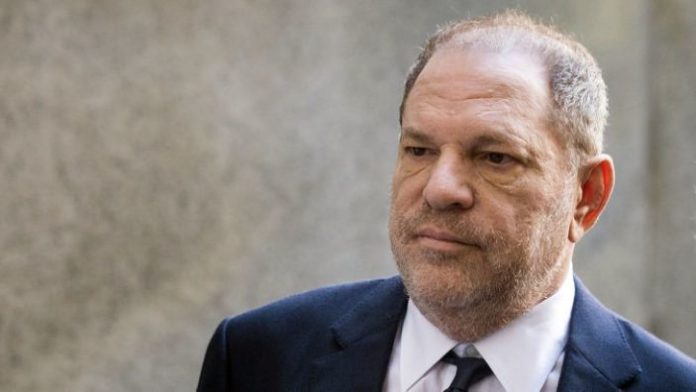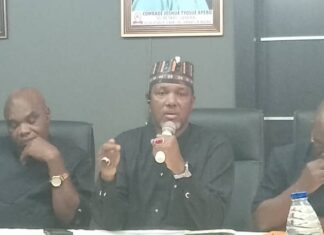Disgraced movie mogul Harvey Weinstein — once revered as one of Hollywood’s most influential power brokers — was found guilty of third-degree rape and a criminal sex act on Monday at his watershed trial in Manhattan.
After over five days of deliberation, jurors in Manhattan Supreme Court cleared Weinstein, 67, of the most serious charge against him, predatory sex assault. He faced five charges, including predatory sexual assault and first-degree rape, for the alleged sexual assault of Miriam Haleyi inside his SoHo apartment in 2006 and the alleged 2013 rape of Jessica Mann inside a New York hotel room.
The verdict comes more than two years after bombshell reports in The New York Times and The New Yorker exposed a slew of sexual-misconduct allegations against Weinstein, launching the global #MeToo movement and inspiring hundreds of women to share their own accounts of harassment and assault at the hands of powerful men in politics, media, and the entertainment industry.
More than 80 women have since come forward to accuse Weinstein of sexual harassment and rape.
Throughout his four-week trial, prosecutors argued the Pulp Fiction producer used his power and prestige in the entertainment industry to prey on women for over three decades, promising to kickstart their careers in exchange for sex acts.
“The universe is run by [Weinstein] so, therefore, they don’t get to complain when they’re stepped on, spit on, demoralized, and then, yes, raped and abused,” Assistant District Attorney Joan Illuzzi said during her closing arguments. “He made sure he can contact the people he was worried about as a little check to make sure one day they wouldn’t walk out in the shadows and call him what he was: an abusive rapist.”
Jurors heard from six of Weinstein’s accusers at trial—with most of them claiming the Oscar-winner lured them into isolated places to discuss their futures in the entertainment industry before sexually assaulting them.
The women admitted they never told the authorities about the abuse out of embarrassment and fear that Weinstein would ruin their chances of making it in Hollywood.
“I decided that going to the police was not an option for me,” Haleyi testified in January. “Also, Harvey has a lot more power and resources, and I really didn’t think I would stand a chance.”
Weinstein’s defense, however, maintained he only had consensual sexual relationships with the women who testified against him—insisting that the film titan was too busy to “develop some grand plan to meet women” and was actually the one being used by aspiring actresses for career gain.
Defense attorney Donna Rotunno argued prosecutors created an “alternate universe” that stripped “adult women of common sense, autonomy, and responsibility” and urged jurors to disregard their “gut feelings” about the producer.
“You don’t have to like Mr. Weinstein, this is not a popularity contest,” Rotunno insisted. “In this country, it is the unpopular person that needs a jury the most.”
At trial, Haleyi, a 42-year-old former Project Runway production assistant, emotionally recounted to jurors how Weinstein allegedly forcibly performed oral sex on her in 2006 at his SoHo home—where she thought they were going to discuss business opportunities. Weeks later, she said she had unwanted sex with Weinstein in a Tribeca hotel room.
“The first incident was deeply embarrassing, but I didn’t blame myself. The second time, I hadn’t struggled enough and just endured it,” said Haleyi, 42. “I just gave up.”
As she sought to pick apart the defense’s argument that the London-born Haleyi was using Weinstein for career opportunities that would allow her to remain in the United States, Illuzzi stressed that a woman should be able to go “unescorted to a man’s apartment and not suffer sexual assault.”
“She wasn’t going to Harvey Weinstein’s apartment to have sex with Harvey Weinstein. She was going to Harvey Weinstein’s apartment to be polite and professional,” the prosecutor said. “Is that consent? Is that consent to have sex? There are no blurred lines here, this is a crime.”
Mann, a 34-year-old former actress, also took the stand and testified that Weinstein assaulted her multiple times during their twisted relationship—including allegedly raping her in a DoubleTree Hotel room in March 2013 and attacking her again months later at a Beverly Hills hotel.
“I was panicked because my worst nightmare was about to happen,” she said through tears, describing the moments before the alleged assault in New York City. “I was very angry inside and very scared. I gave up at that point.”
Born on a dairy farm in Washington state and raised in the evangelical faith, Mann garnered audible gasps in the courtroom as she described her “extremely degrading” relationship with Weinstein—at one point describing his body as “deformed” with “extreme scarring.” She also said he injected himself with “medicine” to maintain an erection.
In an attempt to discredit her account, Weinstein’s defense showed jurors numerous friendly emails Mann sent to the producer after the alleged assaults.
“The question for you is not whether Jessica Mann made a bad decision, the question for you is whether Jessica Mann is lying about it if she’s telling you the truth—that she was raped,” Illuzzi countered.
In addition to Mann and Haleyi, jurors have also heard from four corroborating witnesses whose allegations fall outside the statute of limitations: Sopranos actress Annabella Sciorra, who said Weinstein violently raped her in her apartment in 1993 or 1994; Dawn Dunning, who said Weinstein sexually assaulted her in 2004; Tarale Wulff, who was allegedly assaulted by the producer a year later; and Lauren Young, who was allegedly assaulted in Weinstein’s Beverly Hills hotel room days before the 2013 Oscars.
During deliberations, jurors were asked to weigh Sciorra’s testimony as an aggravating factor to support two counts of predatory sexual assault.
Yahoo news













